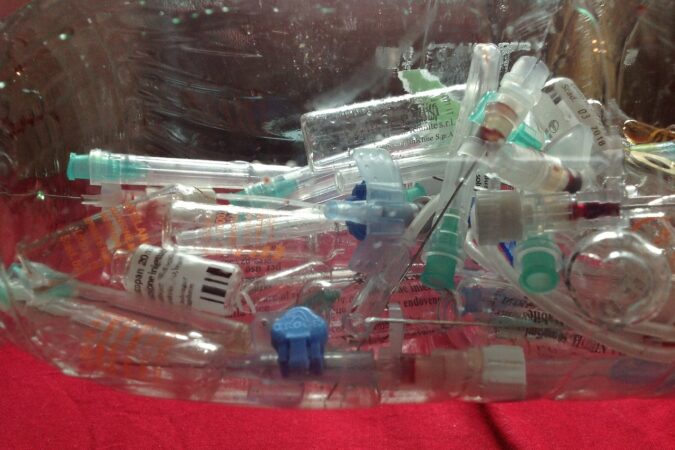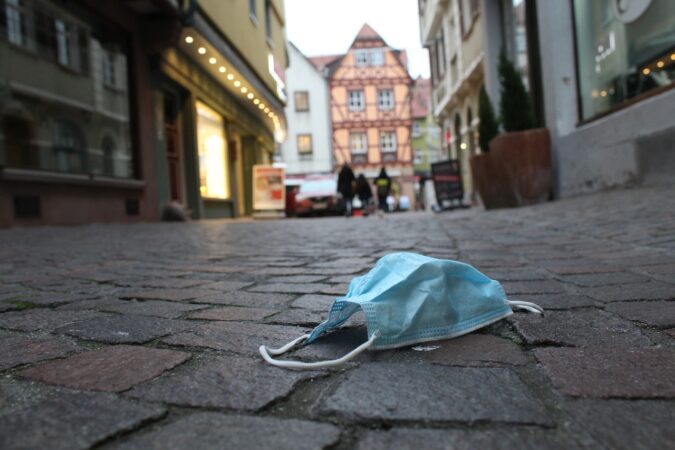
How to Reduce Medical Waste
Reducing medical waste in hospitals, healthcare settings, and at home is vital to protect human health and the environment, and cut costs. Lots of medical waste is incinerated to remove the risk of contamination and harm to human health. Burning waste isn’t environmentally friendly, though sometimes it can convert waste to energy.
The NHS has a target to reduce its carbon emissions by 80% by 2050. Clinical waste management involves destroying a wide range of materials and requires transportation to specialist waste facilities, which all add to the carbon footprint. Reducing medical waste also helps to cut costs for public and private hospitals and healthcare facilities.
Finding ways to reduce healthcare waste lessens the environmental impact of this type of rubbish. Discover how to reduce medical waste in a hospital, healthcare facility, and at home with these expert tips and advice.
Get a free quote
Get a fast FREE quote for waste collection
- Free quote within 1 hr
- Any type of clinical waste
- FREE bins and delivery
- We cover all of the UK
Why is it important to
reduce medical waste?
There are strict procedures in place to store, remove, and dispose of different types of medical waste. Minimising medical waste reduces the risk of improper disposal of clinical waste such as medical instruments, PPE, and medication. This helps limit the potential spread of infection and diseases and contamination of other waste.
Any medical waste that ends up in a landfill site can cause serious problems. Due to the potentially hazardous and toxic nature of some clinical waste, it can leach into the ground and contaminate nearby water as well. Many types of medical waste take a long time to decompose and add to methane emissions too.
Lots of medical waste is incinerated and destroyed as a safe disposal method. Depending on the type of medical waste and the facility, the process may convert waste into energy, which is more sustainable than simply burning waste. However, many incineration processes release hazardous and toxic gases into the air, including particulate matter, metals, acid gases, and sulphur.
Reducing medical waste means less is sent for incineration, which should ensure less air pollution is produced. Transporting medical waste from hospitals, healthcare facilities, and dental surgeries to waste management facilities also adds to carbon emissions. The less clinical waste produced, the fewer collections and journeys are required. This also helps save money on waste management costs.

Medical waste facts
Healthcare waste covers a wide range of waste types. This includes everything from clinical waste after surgery to packaging thrown away by patients in waiting rooms. It’s estimated to account for up to 2% of the total urban waste in the world. Between 75 and 90% of waste produced by healthcare facilities is non-risk according to the UN Environment Programme.
Understand the amount of medical waste generated and why it’s so important to try and reduce it with these facts:
- Global healthcare waste management is estimated to cost more than £14 billion every year
- In total, the NHS currently produces an estimated 156,000 tonnes of clinical waste every year, as well as other types of rubbish
- The NHS sends approximately 86,000 tonnes of waste to landfill every year
- 149,000 tonnes of waste from the NHS are incinerated annually
- Around 137,000 tonnes of waste are recycled by the NHS each year
- Almost 60% of the NHS’ carbon footprint is due to procurement – mainly the production, transportation, and disposal of pharmaceutical and medical devices and instruments
- Food waste costs the NHS £230 million annually
- About 85% of waste from healthcare activities is non-hazardous, while just over 15% of healthcare waste is hazardous
How to reduce waste
in healthcare
The healthcare sector covers everything from dental practices to care homes and pharmacies, so the waste it produces varies. Unsurprisingly the NHS is the healthcare sector’s largest employer with 1.5 million workers in the UK, but there are plenty of private healthcare organisations too.
Similar steps can help reduce across the healthcare sector even though the activities and waste produced differ in type and volume across it. Here are a few ideas for ways to reduce waste in healthcare facilities:
- Provide reusable PPE – single-use personal protective equipment (PPE) is common in many healthcare facilities. It’s used and thrown away immediately, which prevents contamination, but creates lots of waste for incineration. Switching to reusable PPE that can be used multiple times without contamination risks reduces waste.
- Donate unused instruments – single-use instruments are another source of waste. Some charities accept unused medical instruments from single-use instrument packs (like coil or minor ops packs) and send them to hospitals in Africa where resources are limited.
- Minimise paper copies – many healthcare facilities have already switched to digital practices, which minimises and eliminates lots of paper waste. Put a policy in place for when physical paper copies are required to reduce how much paper is used in the healthcare centre.
- Repair medical equipment – steel is used in many medical instruments but is a finite resource. Repairing medical instruments where possible reduces waste and saves resources and energy. Electronic medical equipment can also be repaired rather than replaced to reduce waste. Buying reconditioned medical equipment cuts back on waste and saves money too.
- Conduct regular waste audits – regularly check where waste is produced, what types, and how much across the healthcare facility. This should provide an idea of any issues, whether the waste is being disposed of properly, and show if your plan and policy to reduce waste is working. If not, consider making some tweaks.

How to reduce
hospital waste
Hospitals produce lots of clinical waste with the amount the NHS deals with having a carbon impact of 100,000 tonnes of CO2. As hospitals provide care for all sorts of medical issues, employ many staff, and have lots of visitors, the waste they produce goes beyond just clinical waste.
All hospital waste needs to be reduced where possible to help the environment and save money. Alongside the tips for healthcare facilities, these are some more ways to reduce waste in hospitals:
- Use sterilisation services – disposing of medical instruments after surgery minimises the risk of spreading infection and disease but creates lots of waste. Consider using sterilisation services that can clean various medical instruments so they can be reused. It prevents metal and plastic instruments from being incinerated and saves on resources.
- Have reusable sharps and other clinical waste bins – hospitals must have sharps bins and separate clinical waste bins and bags in place to operate safely. Reusable sharps bins reduce plastic waste compared to using waste bags, while many bins can be emptied and reused.
- Develop a waste management plan – create a plan that covers how all waste produced in the hospital is managed. This includes everything from PPE and old medication to general waste in the bins used by visitors. Set goals to track the plan’s success and review it every few months and update it as necessary.
- Cut back on food waste – many hospitals struggle with food waste, but it can cost millions. Common tips to reduce food waste can be applied in hospitals, such as portion control, regular stock checks, supply and demand, and donating leftovers to charitable causes.
- Conduct inventory checks – regularly assessing levels of medication, PPE, and even food helps reduce the risk of items expiring and being wasted. It can also help prevent your hospital from running low on certain items.
How to reduce
pharmaceutical waste
It’s estimated that every year £300 million of NHS prescribed medicines go to waste. There are various reasons behind this, from medicines expiring on the shelves of pharmacies to accidental disposals. Pharmaceuticals are also wasted at home in some cases as well as at many healthcare facilities.
Here’s how to reduce pharmaceutical waste as a healthcare provider and an individual:
- Donate excess medications – if you’ve got lots of medication that’s due to expire in the near future and is unlikely to be used, certain places accept such donations. Normally they’ll only be accepted if there are at least six months left before expiry.
- Order what you need – prescribing only what’s required rather than dispensing medicines for a longer time than necessary helps cut back on medication waste. Individuals should also refrain from stockpiling over-the-counter (OTC) medication, as it may expire before use, so only order what you need.
- Follow the instructions – failing to adhere to instructions can result in some medication being spoiled before it can be used. Follow the instructions on the pack or from a medical professional to prevent spoilage.
- Use less packaging – healthcare facilities and hospitals can bulk purchase pharmaceuticals to reduce packaging in some cases. Seek medication in recyclable packaging where possible and with reusable elements, such as Vagirux that comes with a reusable applicator.
- Recycle blister packs – the blister packs that contain most OTC medication (like paracetamol, Ibuprofen, and hay fever tablets) create high volumes of packaging waste. Most can’t be recycled at home, but Terracycle provides a recycling scheme for blister packs with drop-off points across the UK. Recycling them helps reduce pharmaceutical waste.

Read more waste reduction guides
Find out how to reduce waste in your business or household with our wide range of expert guides that cover everything from food waste to old clothing.
Get a fast and free quote
Get a fast FREE quote for your waste collection
- Free quote within 1 hr
- Any type of clinical waste
- FREE bins and delivery
- We cover all of the UK